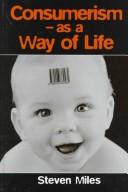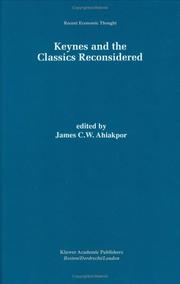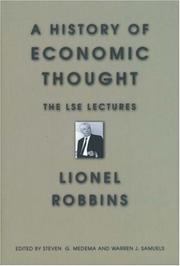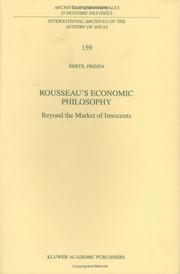| Listing 1 - 8 of 8 |
Sort by
|
Book
ISBN: 9782717834727 2717834729 Year: 1998 Publisher: Paris: Economica,
Abstract | Keywords | Export | Availability | Bookmark
 Loading...
Loading...Choose an application
- Reference Manager
- EndNote
- RefWorks (Direct export to RefWorks)

ISBN: 0761952144 9780761952145 Year: 1998 Publisher: London: Sage,
Abstract | Keywords | Export | Availability | Bookmark
 Loading...
Loading...Choose an application
- Reference Manager
- EndNote
- RefWorks (Direct export to RefWorks)
Sociology of culture --- Consumption (Economics) --- History. --- History --- Consumption (Economics) - History
Book
ISBN: 2130490972 9782130490975 Year: 1998 Volume: *28 Publisher: Paris: PUF,
Abstract | Keywords | Export | Availability | Bookmark
 Loading...
Loading...Choose an application
- Reference Manager
- EndNote
- RefWorks (Direct export to RefWorks)
Economics --- Economie sociale --- Sociological aspects --- History --- Histoire --- Economics - History - 18th century --- Economics - History - 19th century --- Economics - Sociological aspects

ISBN: 0691034192 9786612753398 1400822521 1282753398 140081393X 9780691034195 9781400813933 9781282753396 6612753390 9781400822522 1400808839 140081877X 9781400808830 Year: 1998 Publisher: Princeton, N.J. Princeton University Press
Abstract | Keywords | Export | Availability | Bookmark
 Loading...
Loading...Choose an application
- Reference Manager
- EndNote
- RefWorks (Direct export to RefWorks)
This book provides a surprising answer to two puzzling questions that relate to the very "soul" of the professional study of economics in the late twentieth century. How did the discipline of economics come to be dominated by an approach that is heavily dependent on mathematically derived models? And what happened to other approaches to the discipline that were considered to be scientifically viable less than fifty years ago? Between the two world wars there were two well-accepted schools of thought in economics: the "neoclassical," which emerged in the last third of the nineteenth century, and the "institutionalist," which started with the works of Veblen and Commons at the end of the same century. Although the contributions of the institutionalists are nearly forgotten now, Yuval Yonay shows that their legacy lingers in the study and practice of economics today. By reconsidering their impact and by analyzing the conflicts that arose between neoclassicists and institutionalists, Yonay brings to life a hidden chapter in the history of economics.The author is a sociologist of science who brings a unique perspective to economic history. By utilizing the actor-network approach of Bruno Latour and Michel Callon, he arrives at a deeper understanding of the nature of the changes that took place in the practice of economics. His analysis also illuminates a broader set of issues concerning the nature of scientific practice and the forces behind changes in scientific knowledge.
Economic schools --- anno 1940-1949 --- anno 1910-1919 --- United States --- Institutional economics --- Neoclassical school of economics --- Economics --- History --- Economics -- United States -- History -- 20th century. --- Institutional economics -- History -- 20th century. --- Neoclassical school of economics -- History -- 20th century. --- Business & Economics --- Economic Theory --- Cambridge school of economics --- Marshallian economics --- Classical school of economics --- Schools of economics --- Institutional economics - History - 20th century. --- Neoclassical school of economics - History - 20th century. --- Economics - United States - History - 20th century. --- United States of America

ISBN: 2738461719 9782738461711 Year: 1998 Volume: *50 Publisher: Paris : ©1998 L'Harmattan,
Abstract | Keywords | Export | Availability | Bookmark
 Loading...
Loading...Choose an application
- Reference Manager
- EndNote
- RefWorks (Direct export to RefWorks)
Les thèses de Karl Polanyi (1886-1964, auteur de la "grande transformation"en 1944) sont généralement méconnues. Il est souvent identifié comme ayant apporté un souffle théorique nouveau en anthropologie et en histoire ancienne, en particulier grâce à la publication de ses écrits. La traduction de ses oeuvres en français près de quarante ans après sa publication en Angleterre et aux Etats-Unis explique la forte ignorance en France. Dans d'autres pays Karl Polanyi est une référence débattue et reconnue en particulier au Japon, en Italie et aux Etats-Unis.
Economists --- Economics --- History --- Polányi, Karl, --- #SBIB:33H011 --- Economische geschiedenis --- Social scientists --- Biography --- Polányi, Károly, --- Polanyi, Karl --- Criticism and interpretation --- Anthropology --- Research --- Social aspects --- Polanyi, Karl, --- Economists - Hungary - Biography --- Economics - History --- Polányi, Karl, - 1886-1964 --- Biography. --- History.

ISBN: 0792381491 9780792381495 Year: 1998 Volume: 63 Publisher: Boston: Kluwer,
Abstract | Keywords | Export | Availability | Bookmark
 Loading...
Loading...Choose an application
- Reference Manager
- EndNote
- RefWorks (Direct export to RefWorks)
Classical school of economics --- Ecole libérale classique (Economie) --- Keynesiaanse theorie --- Keynesian economics --- Keynésienne [Théorie ] --- Klassieke school (Economie) --- Théorie keynésienne --- Economics --- Economists --- History --- Keynes, John Maynard, --- Classical school of economics. --- Keynesian economics. --- History. --- Great Britain --- Economics - History --- Economists - Great Britain --- Keynes, John Maynard, - 1883-1946

ISBN: 069101244X 9780691070148 0691070148 1282753592 1400822793 9786612753596 1400813093 9780691012445 9781400822799 9781282753594 9781400813094 Year: 1998 Publisher: Princeton, N.J. : Princeton University Press,
Abstract | Keywords | Export | Availability | Bookmark
 Loading...
Loading...Choose an application
- Reference Manager
- EndNote
- RefWorks (Direct export to RefWorks)
Lionel Robbins's now famous lectures on the history of economic thought comprise one of the greatest accounts since World War II of the evolution of economic ideas. This volume represents the first time those lectures have been published. Lord Robbins (1898-1984) was a remarkably accomplished thinker, writer, and public figure. He made important contributions to economic theory, methodology, and policy analysis, directed the economic section of Winston Churchill's War Cabinet, and served as chairman of the Financial Times. As a historian of economic ideas, he ranks with Joseph Schumpeter and Jacob Viner as one of the foremost scholars of the century. These lectures, delivered at the London School of Economics between 1979 and 1981 and tape-recorded by Robbins's grandson, display his mastery of the intellectual history of economics, his infectious enthusiasm for the subject, and his eloquence and incisive wit. They cover a broad chronological range, beginning with Plato, Aristotle, and Aquinas, focusing extensively on Adam Smith, Thomas Malthus and the classicals, and finishing with a discussion of moderns and marginalists from Marx to Alfred Marshall. Robbins takes a varied and inclusive approach to intellectual history. As he says in his first lecture: "I shall go my own sweet way--sometimes talk about doctrine, sometimes talk about persons, sometimes talk about periods." The lectures are united by Robbins's conviction that it is impossible to understand adequately contemporary institutions and social sciences without understanding the ideas behind their development. Authoritative yet accessible, combining the immediacy of the spoken word with Robbins's exceptional talent for clear, well-organized exposition, this volume will be welcomed by anyone interested in the intellectual origins of the modern world.
Economics --- History --- Économie politique --- Histoire --- 330.8 --- -AA / International- internationaal --- 330.40 --- -330.1 --- Economic theory --- Political economy --- Social sciences --- Economic man --- Geschiedenis van het economisch en sociaal denken --- Evolution historique de la pensée économique et sociale: généralités --- History of the economic and social thinking --- 330.40 Geschiedenis van het economisch en sociaal denken --- 330.40 Evolution historique de la pensée économique et sociale: généralités --- 330.40 History of the economic and social thinking --- Economisch denken. Economische scholen. Economische theorieen --- Geschiedenis van het economisch en sociaal denken. --- 330.8 Economisch denken. Economische scholen. Economische theorieen --- 330.1 --- AA / International- internationaal --- Economic schools --- Histoire. --- History. --- Economics - History

ISBN: 079235270X 9401062285 9401152942 9780792352709 Year: 1998 Volume: 159 Publisher: Dordrecht: Kluwer Academic Publishers,
Abstract | Keywords | Export | Availability | Bookmark
 Loading...
Loading...Choose an application
- Reference Manager
- EndNote
- RefWorks (Direct export to RefWorks)
An increasing body of literature concerns the economics of those highly appreciated qualities of life that are not easily provided by market exchange. Today these problems are visible as never before, for example environmental problems. But already at the dawn of industrial society the problem had been observed by Rousseau. His statements on the economy claim to take these problems into account with due importance. In this way his economic philosophy concerns a different domain of the economy from, for example, Adam Smith's work. Rousseau's philosophy attempts to consider phenomena later labeled information asymmetries and information costs, bargaining, collective good problems. Some of Rousseau's most puzzling social proposals (on theater, women, music, etc.) can be explained by his well-argued conviction that an optimal economy demands a high social morale, a communicative morale. He proposes an economic philosophy for the most important properties of richness - such as experiencing the unique, and being free although dependent on others (empowerment). It is for the adult capable of true deliberation, not for the trifle of the innocent child. He develops a concept of richness that is close to the Aristotelian capability-concept, later explored by Amartya Sen. Rousseau's economic philosophy has not been treated in a monograph before. The book should be rewarding to those interested in social theory, the history of social and economic thought, problems at the margins of market exchange, e.g. cultural economics, environmental economics, students of Rousseau and the thought of the 18th century, welfare economic theory in the direction of Arrow or Sen, and Poanyi's and others' theses about the transition from selfsufficiency to market.
Economists --- Economics --- Economistes --- Economie politique --- History --- Histoire --- Rousseau, Jean-Jacques, --- Contributions in economics --- -Economists --- -Social scientists --- Economic theory --- Political economy --- Social sciences --- Economic man --- -Rousseau, Jean-Jacques --- -Contributions in economics --- -History --- Social scientists --- Rousseau, Jean Jacques --- Rousseau, Jean-Jacques --- Switzerland --- 18th century --- Contributions in economics. --- Economic history. --- Philosophy. --- Economic theory. --- Public finance. --- Modern philosophy. --- History of Economic Thought/Methodology. --- Philosophy, general. --- Economic Theory/Quantitative Economics/Mathematical Methods. --- Public Economics. --- Modern Philosophy. --- Modern philosophy --- Cameralistics --- Public finance --- Public finances --- Currency question --- Mental philosophy --- Humanities --- Economic conditions --- History, Economic --- Rouseau, Jan Jakub, --- Russo, Zhan Zhak, --- Rousseau, John James, --- Rūssū, Jān Jāk, --- Lu-so, --- Ru-xô, Giăng-Giá̆c, --- Rousseau, Jean Jaques, --- Rousseau, Jean Jeacques, --- Rousseau, J. J. --- Rusō, Jan Jakku, --- Rousseau, Gian Giacomo, --- Ruso, Z'an Z'aḳ, --- Rūcō, --- Citoyen de Genève, --- Citizen of Geneva, --- Roussō, --- Rousseau, --- Rūssō, --- Rousseau, Johann Jacob, --- Руссо, Жан-Жак, --- רוסא, זשאן־זשאק --- רוסא, י׳ן י׳ק, --- רוסו, זאאן זאאק, --- רוסו, ז׳אן־ז׳אק, --- روسو، چان چاك --- روسو، ژان ژاك --- 卢梭, --- Rousseau, Juan Jacobo, --- Rousseau, G. G. --- Ruso, Jan Jak, --- Rūsaw, Zhān Zhāk, --- Rūsū, Zhān Zhāk, --- Economists - Switzerland --- Economics - History - 18th century --- Rousseau, Jean-Jacques, - 1712-1778 --- Rousseau (jean-jacques), 1712-1778 --- Pensee politique et sociale
| Listing 1 - 8 of 8 |
Sort by
|

 Search
Search Feedback
Feedback About UniCat
About UniCat  Help
Help News
News